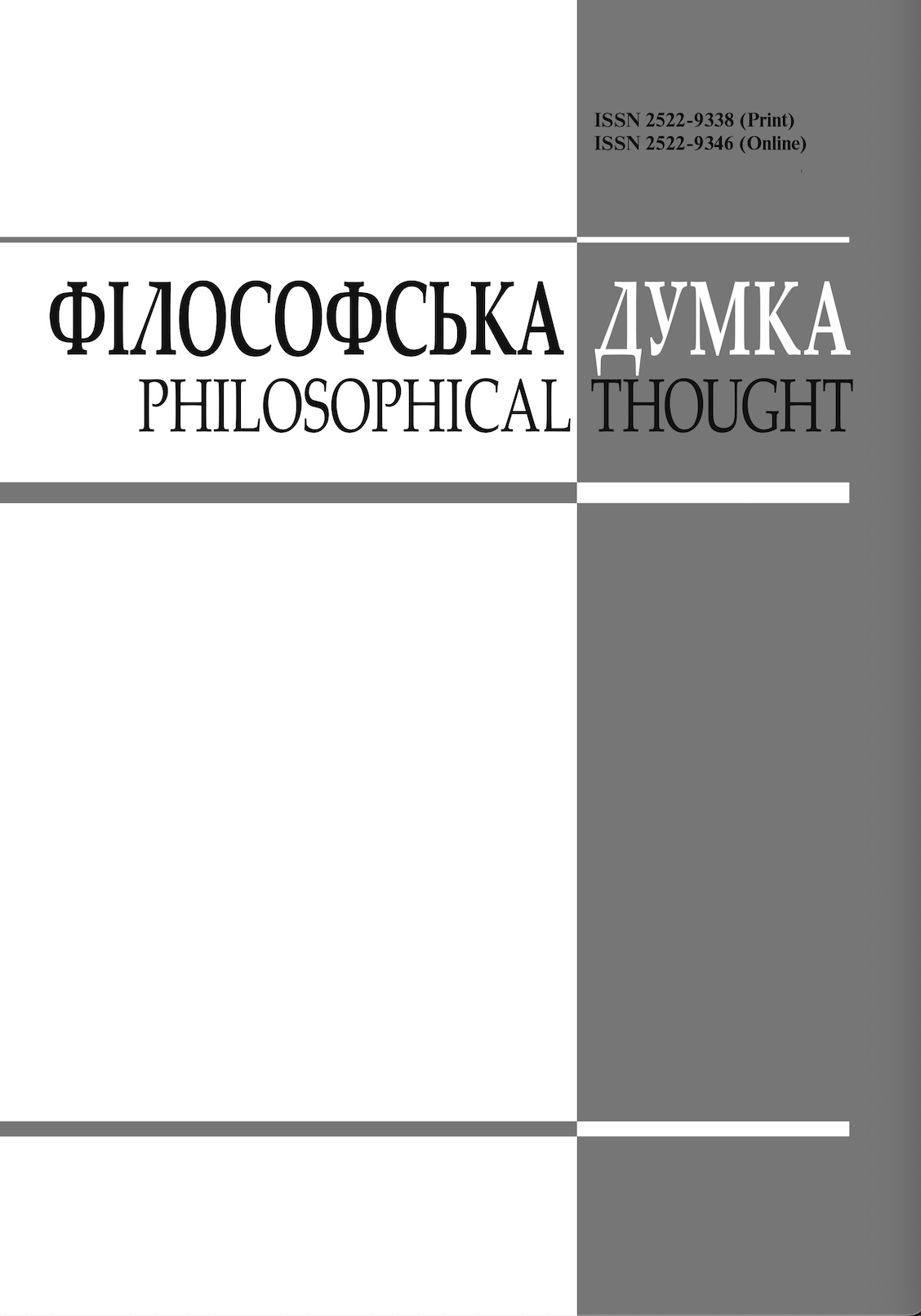Kant’s sentence of the moral law as a “fact of reason”: hermeneutical and historiographical perspectives
THE YEAR OF IMMANUEL KANT
DOI:
https://doi.org/10.15407/fd2024.01.007Keywords:
Kant, moral philosophy, categorical imperative, fact of reason, studies of KantAbstract
Kant's well-known statement from the “Critique of Practical Reason” (§ 7) that the consciousness of the basic law of pure practical reason (or the customary/moral law) can be called a fact of reason (V, 31.24) has not yet become the subject of adequate attention of domestic researchers. In the “Critique of Practical Reason”, Kant justify his famous categorical imperative by appealing to the “fact of reason” (§ 7). A closer reading of this passage reveals that it refers to a “fundamental law of pure practical reason” and its “consciousness” is called “a fact of reason”. It is likely to think that Kant makes a “naturalistic fallacy” when he tries to justify “ought” (law) from “is” (fact). An analysis of the broader context of the use of the term “fact”, which occurs in the Critique in general 11 times, proves that its denotation is a moral law, which is explained in the corresponding train of thought. A special problem of interpretation is the explanation of the genitive in the expression “a fact of reason” [ein Factum der Vernunft]. It is common to read it as genitivus subjectivus (the fact is a product (act) of the reason, the fact arises thanks to the reason) and as genitivus objectivus (the reason itself is a fact, something factual). But from the standpoint of modern studies of Kant its reading as genitivus auctoris (Willaschek, Wolff, Noller) is promising. Kant’s specific use of the Latin form “ein Factum” in other works, which has the meaning not of “fact”, but of “imputable act” also, testifies in favor of this. Starting with Dieter Heinrich’s article “The Concept of Moral Insight and Kant’s Doctrine of the Fact of Reason” (1960), many researchers interpret the thesis of the “fact of reason” as Kant’s rejection of the attempt at the deduction of moral insight in the “Groundwork of the Metaphysics of Moral” (1785). However, as modern studies (Riedel, Wolff) show, this interpretation is not convincing enough. There are sufficient reasons to believe that it is Kant’s moral and legal doctrine of imputatio facti can explicate an enigmatic passage of the II Critique.
References
Beck, L. W. (1960). A Commentary on Kant's Critique of Practical Reason. Chicago: The University of Chicago Press.
Beck, L. W. (1961). Das Faktum der Vernunft: Zur Rechtfertigungsproblematik in der Ethik. Kant-Studien, 52, 271-282.
https://doi.org/10.1515/kant.1961.52.1-4.271
Böhme, H., Böhme, G. (1985). Das Andere der Vernunft. Zur Entwicklung von Rationalitätsstrukturen am Beispiel Kants. Frankfurt a. M.: Suhrkamp.
Henrich, D. (1954/55). Das Prinzip der Kantischen Ethik. Philosophische Rundschau, II, 20-38.
Henrich, D. (1960). Der Begriff der sittlichen Einsicht und Kants Lehre vom Faktum der Vernunft. In: Die Gegenwart der Griechen im neueren Denken. Festschrift für Hans-Georg Gadamer. Hrsg. von Dieter Henrich, Walter Schulz, Karl-Heinz Volkmann-Schluck (SS. 77-115). Tübingen: Mohr.
Ilting, K.-H. (1972). Der naturalistische Fehlschluß bei Kant. In: Rehabilitierung der praktischen Philosophie. Hrsg. von Manfred Riedel (Bd. I, SS. 113-130). Freiburg: Rombach.
Irrlitz, G. (2015). Kant-Handbuch. 3. Aufl. Stuttgart: Metzler.
https://doi.org/10.1007/978-3-476-05432-6
Jodl, F. (1923). Geschichte der Ethik als philosophischer Wissenschaft. 3. Aufl. Bd. II. Stuttgart, Berlin: Cotta.
Kant, I. (1900). Gesammelte Schriften. Hrsg. von der Königlich Preußischen Akademie der Wissenschaften. Berlin: de Gruyter.
Kant, I. (1998). Kritik der reinen Vernunft. Hrsg. von Jens Timmermann. Hamburg: Meiner.
Kaufmann, M. (2007). Autonomie und das Faktum der Vernunft. In: Kant in der Gegenwart. Hrsg. von Jürgen Stolzenberg (SS. 227-245). Berlin, New York: de Gruyter.
https://doi.org/10.1515/9783110208733.4.227
Noller, J. (2021). Faktum der Vernunft? Kant und Hume über das Sein des Sollens. In: Sein und Sollen. Perspektiven in Philosophie, Logik und Rechtswissenschaft. Hrsg. von G. Karageorgoudis, J. Noller (SS. 115-141). Paderborn: Brill - Mentis.
https://doi.org/10.30965/9783957437082_007
O'Neill, O. (2002). Autonomy and the Fact of Reason in the 'Kritik der praktischen Vernunft'. In: O. Höffe (Hrsg.), Immanuel Kant: Kritik der praktischen Vernunft (Klassiker Auslegen) (Bd. 26, SS. 81-97). Berlin: Akademie 2002.
https://doi.org/10.1524/9783050050317.81
Prauss, G. (2017). Kant über Freiheit als Autonomie. 2. Aufl. Frankfurt a. M.: Klostermann.
https://doi.org/10.5771/9783465142966
Reininger, R. (1923). Kant, seine Anhänger und seine Gegner. München: Reinhardt.
Riedel, M. (1989). Imputation der Handlung und Applikation des Sittengesetzes. Über den Zusammenhang von Hermeneutik und praktischer Urteilskraft in Kants Lehre vom "Faktum der Vernunft". In: M. Riedel, Urteilskraft und Vernunft. Kants ursprüngliche Fragestellung (SS. 98-124). Frankfurt a. M.: Suhrkamp.
https://doi.org/10.5771/0340-7969-1989-1-27
Sala, G. (2004). Kants "Kritik der praktischen Vernunft". Ein Kommentar. Darmstadt: Wissenschaftliche Buchgesellschaft.
Schopenhauer, A. (1919). Die beide Grundprobleme der Ethik. In: A. Schopenhauer, Sämmtliche Werke. Hrsg. von J. Frauenstädt. 2. Aufl. Bd. 4. Leipzig: Brockhaus.
Willaschek, M. (1992). Praktische Vernunft. Handlungstheorie und Moralbegründung bei Kant. Stuttgart, Weimar: Metzler.
https://doi.org/10.1007/978-3-476-05577-4
Wolff, M. (2009). Warum das Faktum der Vernunft ein Faktum ist. Auflösung einiger Verständnisschwierigkeiten in Kants Grundlegung der Moral. Deutsche Zeitschrift für Philosophie, 57(4), 511-549.
Downloads
-
PDF (Українська)
Downloads: 146
Published
How to Cite
Issue
Section
License
Authors who publish with this journal agree to the following terms:
- Authors retain copyright and grant the journal right of first publication.
- Authors are able to enter into separate, additional contractual arrangements for the non-exclusive distribution of the journal's published version of the work (e.g., post it to an institutional repository or publish it in a book), with an acknowledgement of its initial publication in this journal.
- Authors are permitted and encouraged to post their work online (e.g., in institutional repositories or on their website) prior to and during the submission process, as it can lead to productive exchanges, as well as earlier and greater citation of published work (See The Effect of Open Access).


